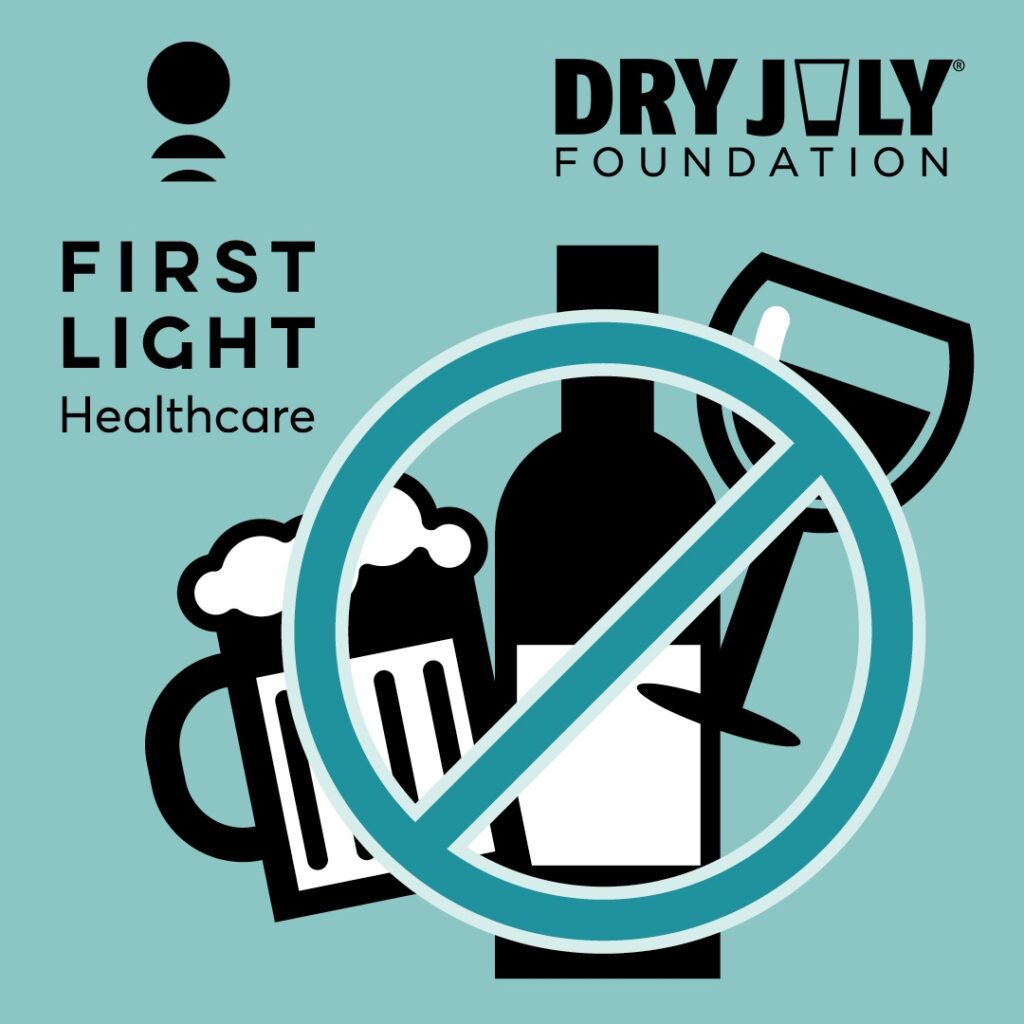DRY JULY 2022

Dry July is the fundraiser that encourages you to go alcohol-free during the month of July to raise funds for people affected by cancer. If you participate in the event, the funds you raise as part of your Dry July participation will provide invaluable services for Australian cancer patients, their families and carers.
But for you personally, a month of not drinking alcohol may surprise you by the great health benefits you reap, such as sleeping better, having more energy and of course, no hangovers! Add to that, you’ll save money while helping yourself and others. It’s the ultimate win-win!
Do You Know What Drinking Alcohol Does to Your Body?
If you’re a regular drinker, have you ever wondered what it would be like to ban the booze for even a short period of time? Alcohol has been associated with a wide range of immediate and long-term effects on the body. This includes causing some types of cancer, liver disease, long-term cognitive impairment, affecting diabetes management and causing harm to unborn children.
To reduce the risk of harm from alcohol-related disease or injury, healthy men and women should drink no more than 10 standard drinks a week and no more than four standard drinks on any one day. The less you drink, the lower your risk of harm from alcohol. ***
To prevent harm from alcohol to their unborn child, women who are pregnant or planning a pregnancy should not drink alcohol. For women who are breastfeeding, not drinking alcohol is safest for their baby.
Drinking too much alcohol, that is more than the recommended Australian National Health and Medical Research Council’s guidelines as listed above, can negatively impact your health. Just some of the health consequences include high blood pressure, heart disease, stroke, liver disease, and digestive problems.
Other health consequences of too much alcohol intake include a variety of cancers. These include cancer of the breast, mouth, throat, oesophagus, voice box, liver, colon, and rectum. Weakening of the immune system, which increases your chances of getting sick is also a consequence. As well, too much alcohol intake can cause learning and memory problems, including dementia as well poor study and work performance. ****
Timeline of Benefits if You Quit Alcohol for One Month
One Hour After You Quit
This is when your body kicks into high gear to eliminate the alcohol from your bloodstream. An hour after your last drink, your liver starts working overtime. Alcohol is also proven to trigger intense hunger and carb cravings, leading to overeating and for excessive drinkers, excess weight.
One Day After You Quit
Your blood sugar will start to normalise, however due to the diuretic effect that alcohol has on our bodies, you’re still going to be dehydrated. This is the time to reach for a water bottle to help hydrate your body.
Two Days After You Quit
After a couple of days, your body has detoxed most of the alcohol in your system. Depending on how much you drank, the headaches and tiredness may still be lingering, but the worst is over.
Three Days After You Quit
Any hangover side-effects from alcohol are likely now out of your system. Your carb cravings should be diminished, and you should feel back to yourself both physically and mentally.
One Week After You Quit
By this stage after quitting alcohol, you start sleeping better, helping both your physical and mental wellbeing. You may also start to notice that your skin is looking brighter and more hydrated, especially if you have kept up a good intake of water of at least eight glasses a day.
Two Weeks After You Quit
This is the point where you may start to notice weight loss. Alcohol in all forms is full of empty calories, so eliminating these calories can start to lead to weight loss – even after a couple of weeks. Drinking alcohol to excess also leads to poor choices in diet, especially late-night binges on carbs.
Another factor adding to weight loss, is by this mark in time your liver has started to repair itself. If you tend to drink too much your liver can become fatty, or even damaged, again leading to poor health and weight gain. Yet another component to weight loss when you quit alcohol, is you are far more likely to begin, or stick to an exercise regime.
Three to Four Weeks After You Quit
Many of the benefits of the first two weeks of quitting alcohol will continue to improve. But by the stage of three to four weeks abstaining, if you have high blood pressure, especially if it is due to excessive drinking, your blood pressure will start to return to a healthier level.
One Month After You Quit
Congratulations, you’ve made it! Your body and mind will be thanking you in spades. Your liver function continues to repair at 30 days, filtering out more toxins and more efficiently, leaving you more energetic and productive. And, at 30 days, for those that have drunk alcohol regularly, you will be really start to notice some weight loss.
Also at this mark of one month of sobriety, your skin will be noticeably improved, your blood glucose level will have dropped, and you may have reduced your levels of ‘bad’ cholesterol. Importantly, you may also see a marked improvement in your mental health. Many people forget that while alcohol may loosen inhibitions, alcohol is a depressant, often resulting in anxiety and depression. Take alcohol away and most people will reset to a happier, less anxious mental setting.
Study Shows Long-Term Benefits of Short-Term Sobriety
One of the more interesting recent studies on the benefits of quitting alcohol for the short term originally came out in the UK after a team of researchers followed up on participants in the annual FebFast campaign. This study, also backed up by a New Scientist study revealed some interesting long-term benefits from a short-term program of alcohol abstinence. *****
Julie Rae, the Australian Drug Foundation’s head of information and research, also took the implications of the UK study to an Australian population, citing that the evidence displays that it is indeed the case – there are long-term benefits to sticking to a short-term of sobriety.
Julie Rae points out that researchers in the UK examined the impact of taking part in Dry January, was that not only were people unlikely to drink more after the voluntary month off alcohol, but most participants also wound-up drinking less than they had before taken part – and were still drinking less six months later. **
When researchers delved into the statistics of their FebFast participants after the event, they found that 51 per cent of people were drinking less often as a result of taking part, and 49 per cent consumed less alcohol when they did have a drink. And after full year, it was found that more than a third of those who took part in FebFast were still drinking less, compared to before taking part in the campaign.
This is great news for those that would like to drink less in the long-term, it turns out, that maybe all you need is a period of time to become more aware of your alcohol intake – and see and feel the benefits for yourself. **
Get Involved Dry July:
https://www.dryjuly.com/
Sources:
* https://www.healthline.com/
** https://www.bupa.com.au/
*** https://www.health.gov.au/
**** https://www.cdc.gov/
***** https://www.newscientist.com/



